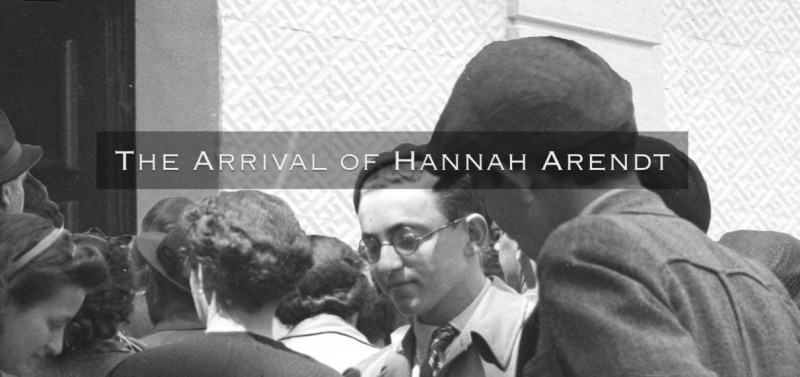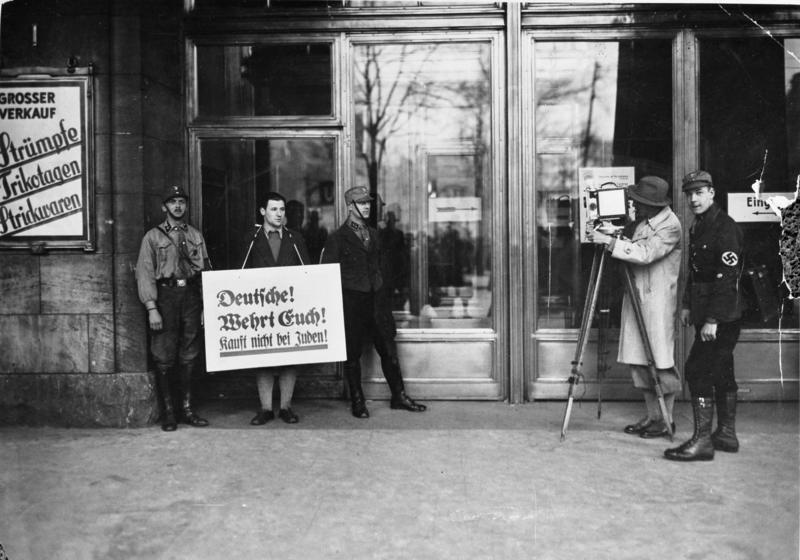
The Arrival of Hannah Arendt
This film describes the arrival of Hannah Arendt - a Jewish, German-American political theorist and publicist - in New York and her reflections on flight and helping people start over.

Wie regelmäßig ging ich auch heute hin, trafen sich doch hier stets die angesehensten und bekanntesten Kolleginnen Berlins. „Komische Stimmung heute”, dachte ich und so viele fremde Gesichter. Eine mir unbekannte Kollegin sagte zu mir: „Sie gehören doch wohl auch zu uns?” und zeigt mir ihr Hakenkreuz an ihrem Mantelkragen.
Eine andere Kollegin – ich kenne sie, sie war meine Vorgängerin im Roten Kreuz und damals ziemlich linksstehend – wegen Untüchtigkeit und anderer nicht sehr feiner menschlicher Qualitäten war sie seiner Zeit entlassen worden – sie steht auf und sagt, „nun bitte ich also die deutschen Kolleginnen zu einer Besprechung ins Nebenzimmer”. Kollegin S., eine gute Katholikin, steht auf und fragt: „Was heißt das, die deutschen Kolleginnen?” „Natürlich alle, die nicht Jüdinnen sind”, lautet die Antwort. So war es gesagt. Schweigend stehen wir jüdischen und halbjüdischen Ärztinnen auf und mit uns einige „deutsche” Ärztinnen. Schweigend verlassen wir den Raum, blaß, bis ins Innerste empört. Wir gingen dann zu Kollegin Erna B., zu besprechen, was wir tun sollen. „Geschlossen unseren Austritt aus dem Bund erklären”, sagen einige. Ich bin dagegen. Nun will ich sehen, was weiter kommt. Ich bin so erregt, so traurig und verzweifelt, und ich schäme mich für meine „deutschen” Kolleginnen! […]
Ein Brief vom Magistrat Charlottenburg: „Sie werden gebeten, Ihre Tätigkeit als leitende Arztin der Frauen- und Beratungsstelle einzustellen!” Aus.

As regularly I went there also today, but always met here the most respected and best known colleagues of Berlin. “Strange atmosphere today,” I thought, and so many strange faces. A colleague I didn’t know said to me: “You belong to us, don’t you?” and shows me her swastika on her coat collar.
Another colleague – I know her, she was my predecessor in the Red Cross and at that time quite left-wing – because of ineptitude and other not very fine human qualities she had been dismissed at the time – she stands up and says, “so now I’m asking the German colleagues to come into the next room for a meeting”. Colleague S., a good Catholic, stands up and asks, “What does that mean, the German colleagues?” “Of course, all those who are not Jewish,” is the answer. That is how it was said. Silently we Jewish and half-Jewish female doctors stood up and with us some “German” female doctors. Silently we leave the room, pale, outraged to the core. We then went to colleague Erna B., to discuss what we should do. “Unitedly declare our withdrawal from the association,” some say. I am against it. Now I want to see what comes next. I am so aroused, so sad and desperate, and I am ashamed of my “German” colleagues! […]
A letter from the Charlottenburg Magistrate: “You are requested to cease your activities as head physician of the Women’s and Counseling Center!” the End.
Hertha Nathorff, née Einstein (1895-1993) was a German pediatrician, psychotherapist and social worker, she published several works, including a book of poems. She was born in Laupheim (Baden-Württemberg) into a Jewish family. She was related to the physicist Albert Einstein, the musicologist and music critic Alfred Einstein, and the film producer Carl Laemmle. Nathorff attended high school in Ulm and, interrupted by a temporary job as a nurse during World War I, studied medicine in Munich, Heidelberg, Freiburg (Breisgau) and Berlin from 1914. After receiving her doctorate degree in Heidelberg (1920) and years as an assistant in Freiburg, she was a senior physician at the Red Cross Women’s and Children’s Home in Berlin-Lichtenberg from 1923-28, then worked in private practice and simultaneously at the Charlottenburg Hospital as head of the family and marriage counseling center. In the course of National Socialist racial policies, she lost her medical license in the fall of 1938, while her husband, formerly a senior hospital doctor in Berlin-Moabit, was granted a license for exclusively Jewish patients. During this period she worked as his receptionist.
Threatened with death in Nazi Germany, she organized emigration with the help of American relatives from November 1938, sending her 14-year-old son ahead to England on a Kindertransport. In April 1939 the couple managed to leave the country for London, and in early 1940 they continued their journey to New York. In New York she worked as a nurse, maid, bar pianist and kitchen help to support the family. She remained a physician’s assistant in her husband’s practice, which opened in 1942 – she did not have the time to get her degree recognized.
Hertha Nathorff took a very active part in the social life of the German-speaking exile community: she organized courses for emigrants in nursing and infant care and cultural events, was the founder of the Open House for the elderly, chairwoman of the women’s group, and an honorary member of the presidium of the New World Club. In the excerpts from the diary of Hertha Nathorff Berlin-New York Aufzeichnungen 1933 bis 1945, which we show in our archive, the author deals with her initial problems, disappointments and mortifications in the New World. She reports on the everyday life of emigrants, on the struggle for existence, on poverty and mental destruction. Despite her longing for the places of her childhood and youth, she never visited Germany again. She never really settled in America. The homesickness remained constant.
Excerpt from the diary of Hertha Nathorff, edited and introduced by Wolfgang Benz (1987): Das Tagebuch der Hertha Nathorff. Berlin – New York. Aufzeichnungen 1933 bis 1945. Schriftenreihe der Vierteljahrshefte für Zeitgeschichte, Band 54. R. Oldenbourg Verlag München, pp.40-41.
Translation from German to English © Minor Kontor / We Refugees Archive.